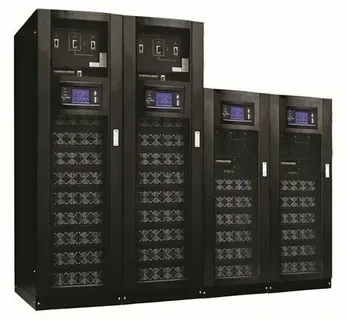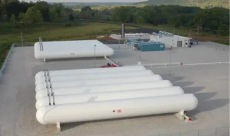Modular Uninterruptible Power Supply Poised for Significant Growth
Introduction
The Modular Uninterruptible Power Supply Market has been witnessing unprecedented growth as organizations across various sectors increasingly rely on uninterrupted power solutions to support critical infrastructure and operations. According to recent research, the Modular UPS was valued at USD 5.28 billion in 2023 and is projected to expand to an impressive USD 12.48 billion by 2032, growing at a Compound Annual Growth Rate (CAGR) of 10.03% over the forecast period from 2024 to 2032. This upward trajectory is driven by the expanding reliance on data centers, cloud computing, telecommunication, and financial services, along with growing concerns regarding energy efficiency and the sustainability of power infrastructure.
Overview
A Modular Uninterruptible Power Supply is a scalable power protection system that offers the flexibility to add or reduce capacity based on the specific power demands of a business. The modular architecture ensures efficiency, redundancy, and scalability, making it a preferred solution for organizations aiming to ensure uninterrupted power for critical systems.
In recent years, the growing importance of minimizing downtime in data centers, healthcare, financial services, and government sectors has boosted the adoption of Modular UPS systems. These systems provide consistent, high-quality power, while their modular structure offers the added advantage of easier upgrades, reduced maintenance costs, and energy efficiency.
Modular UPS Segmentation
The Modular UPS is broadly segmented based on component, organization size, verticals, and regions.
- By Component:
- Solution: The solution segment includes the hardware and software necessary for the operation of Modular UPS systems. The growing demand for scalable and flexible power systems has propelled this segment to lead the .
- Services: This includes installation, maintenance, and consultancy services. The need for specialized services to ensure optimal system performance and maximize lifespan will continue driving demand in this segment.
- By Organization Size:
- Large Enterprises: Large organizations with significant data center and infrastructure needs are the primary adopters of Modular UPS solutions, seeking the benefits of scalability and redundancy.
- Small and Medium Enterprises (SMEs): SMEs are increasingly investing in Modular UPS systems to ensure power continuity, especially as they embrace digital transformation and cloud-based services.
- By Verticals:
- BFSI (Banking, Financial Services, and Insurance): The financial sector requires high levels of uptime, making Modular UPS systems a crucial component in ensuring continuous operations.
- Cloud Service and Colocation Providers: The increasing reliance on cloud services and colocation facilities has made uninterrupted power supply critical for data availability and security.
- Telecom: With the rapid growth of telecommunications infrastructure and 5G rollout, Modular UPS systems are essential to ensure continuous power in remote and urban areas.
- Manufacturing: In the manufacturing industry, where continuous power supply is necessary for production lines, Modular UPS systems prevent costly downtimes.
- Healthcare: In healthcare facilities, uninterrupted power supply is critical to the operation of life-saving equipment and patient care systems.
- Energy and Utilities: The energy and utilities sector benefits from Modular UPS systems for grid reliability and power backup in distributed energy resources.
- Government and Public Sector: Government entities are focusing on robust power solutions to ensure operational continuity, especially in critical infrastructure.
- Others: Sectors such as retail, education, and entertainment also contribute to the increasing demand for Modular UPS solutions.
Global Demand and Regional Insights
The demand for Modular UPS systems is expanding across the globe, with specific growth patterns observed in different regions:
- North America: North America is leading the due to the presence of key industry players, high digital adoption rates, and the continuous expansion of cloud computing infrastructure. The region’s emphasis on energy-efficient solutions further supports the growth of the .
- Europe: Europe follows closely behind, driven by the stringent regulatory environment around energy efficiency and power reliability. Countries such as Germany, the UK, and France are prominent adopters of Modular UPS systems due to their well-established data centers and financial services industries.
- Asia-Pacific: The Asia-Pacific region is expected to witness the fastest growth, thanks to the rapid development of IT infrastructure, data centers, and cloud computing platforms in countries like China, India, and Japan. As businesses in the region continue to digitize and expand, the need for reliable power solutions will drive growth.
- Middle East & Africa and Latin America: These regions are also set to experience moderate growth, as increasing investments in infrastructure development and telecommunications fuel demand for Modular UPS systems.
Technological Innovations and Future Trends
The Modular UPS is expected to benefit from several emerging trends and innovations over the coming years:
- Energy Efficiency and Sustainability: With growing concerns over climate change, there is increasing demand for power systems that consume less energy and reduce carbon footprints. Modular UPS systems, designed for efficiency, offer an eco-friendly solution.
- Integration with Renewable Energy Sources: As companies seek to integrate renewable energy into their power systems, Modular UPS systems are being designed to work seamlessly with solar and wind power, ensuring uninterrupted power during energy transitions.
- AI and Automation: The integration of artificial intelligence (AI) and automation technologies into Modular UPS systems will allow for predictive maintenance, system optimization, and enhanced energy management, resulting in greater efficiency and cost savings.
- Edge Computing: The rise of edge computing, which requires localized data processing closer to the source, will further drive demand for Modular UPS systems, particularly in remote and distributed environments.
SWOT Analysis
- Strengths: Scalability, energy efficiency, lower operational costs, and easier maintenance make Modular UPS systems highly competitive in the .
- Weaknesses: Initial setup costs for Modular UPS systems can be higher compared to traditional UPS solutions, which may limit adoption by smaller enterprises.
- Opportunities: Growing adoption of cloud services, 5G, and digital transformation, especially in emerging s, presents vast opportunities for Modular UPS vendors.
- Threats: Intense competition and the rapid pace of technological advancements could lead to price pressures and shorter product life cycles.
Conclusion
The global Modular Uninterruptible Power Supply is on a promising growth trajectory, driven by technological advancements, the increasing demand for energy-efficient solutions, and the critical need for uninterrupted power across various sectors. As organizations continue to digitize and prioritize power reliability, the Modular UPS is poised for robust expansion, with significant opportunities for innovation and growth in the coming decade.
Read More Details @ https://www.snsinsider.com/reports/modular-uninterruptible-power-supply-market-3194
Contact Us:
Akash Anand – Head of Business Development & Strategy
Phone: +1-415-230-0044 (US) | +91-7798602273 (IND)
SNS Insider Offering/ Consulting Services:
Go To Market Assessment Service




